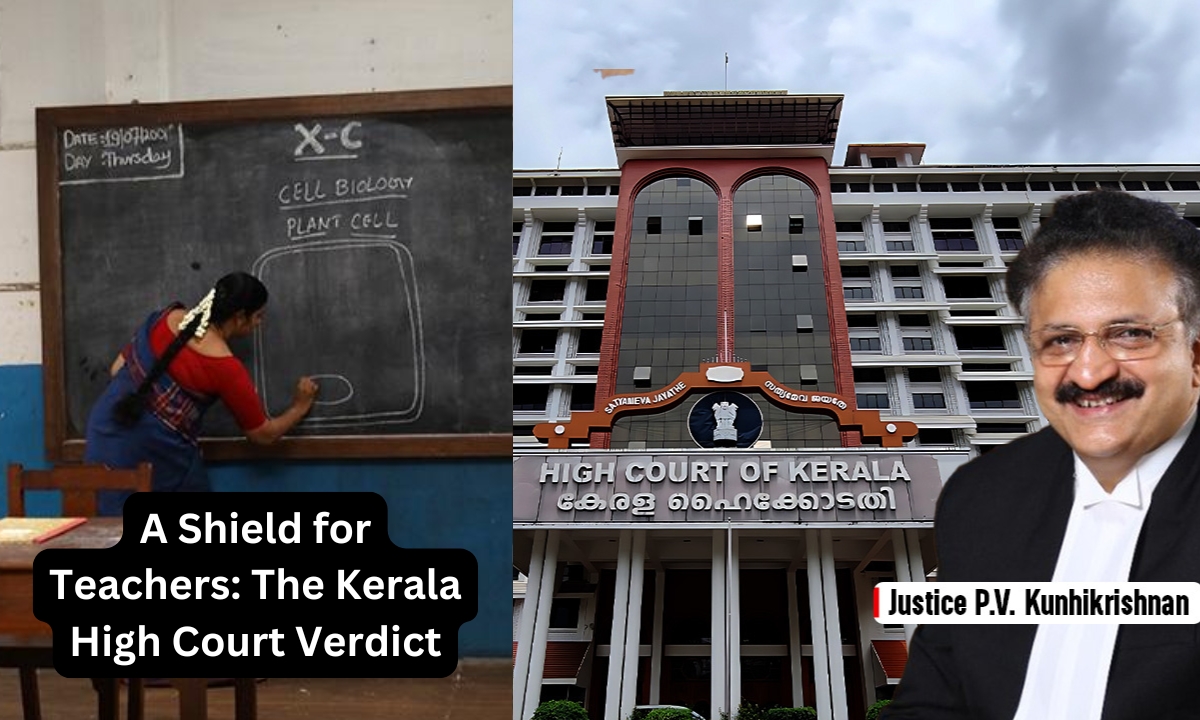Hello Friends, Imagine a world where teachers, the very people shaping our future generations, live in constant fear of criminal charges for simply disciplining a student. It sounds unsettling, right? Unfortunately, many teachers today hesitate to enforce discipline because they are afraid of legal action. Recognizing this issue, the Kerala High Court has taken a bold step to protect educators from unnecessary criminal cases.
A Shield for Teachers The Kerala High Court Verdict
The Kerala High Court recently ruled that no criminal case should be registered against a teacher for acts committed inside an educational institution without a preliminary enquiry. This means that if a parent or student files a complaint, the police must first investigate whether the teacher’s actions genuinely warrant a case before proceeding further. This directive aims to prevent teachers from being unfairly targeted for minor disciplinary actions taken in good faith.

Justice P. V. Kunhikrishnan, while delivering the judgment, made a crucial observation: teachers should not be afraid of facing criminal prosecution simply for giving minor punishments, as long as they act without malice. He emphasized that if students face no discipline in schools, their behavior and values may be at risk.
Understanding the Need for This Decision
The Kerala High Court highlighted a growing concern teachers are becoming reluctant to correct students due to the increasing fear of legal consequences. With students having easy access to harmful influences like drugs, alcohol, and even weapons, schools need a strong system of discipline. The judgment acknowledged that in the past, strict yet fair discipline helped shape students into responsible adults. But today, even a simple push or a firm word from a teacher can result in criminal charges. This, the Court believes, should stop. The Kerala High Court also referenced Section 173(3) of the Bharatiya Nagarik Suraksha Sanhita (BNSS), which allows police to conduct a preliminary enquiry before registering a case for offences punishable with three to seven years of imprisonment. By applying this provision to cases involving teachers, the judgment ensures that only genuine cases of misconduct will lead to legal action, preventing unnecessary harassment of educators.
A Cane in Hand A Symbol or a Solution?
One of the most talked-about aspects of this judgment was the Court’s remark that teachers should be allowed to carry a cane in their hands not necessarily to use it, but as a symbol of authority. The Kerala High Court argued that the mere presence of a cane could have a psychological effect on students, discouraging them from engaging in wrongful activities. While this statement is controversial, it highlights an important discussion about how schools should maintain discipline in a time when student misconduct is on the rise. Many educators today struggle to manage classrooms effectively, and this ruling acknowledges the difficulties they face.
Balancing Discipline and Student Rights
While this judgment aims to protect teachers, it also brings up critical questions about student rights and appropriate disciplinary measures. The world has largely moved away from corporal punishment, focusing instead on positive reinforcement and counseling. However, the Court’s verdict does not encourage harsh punishment but rather seeks to create a safer and more practical environment where teachers can do their jobs without fear. The judgment also ensures that during the preliminary enquiry period, the accused teacher will not be arrested, preventing unnecessary distress and disruption to their career.
A Step Towards a Fairer Education System
The Kerala High Court decision is a landmark step toward striking a balance between protecting teachers and ensuring student well-being. It acknowledges that discipline is essential in schools but also ensures that no teacher is unfairly prosecuted for doing their duty.

The ruling might spark debates, especially regarding the cane issue, but at its core, it is about restoring teachers’ confidence in their roles as educators and mentors. Schools should be a place of learning, discipline, and growth, and this decision aims to preserve that.
Disclaimer: This article is for informational purposes only and does not encourage any form of corporal punishment. The content reflects the judgment of the Kerala High Court and aims to provide a balanced perspective on the issue.
Also Read:
Evolution and Scope of Administrative Law
Understanding the Law of Torts Bare Act: A Complete Guide
Supreme Court Slams Overpriced Lawyers: Justice Must Be Accessible to All






